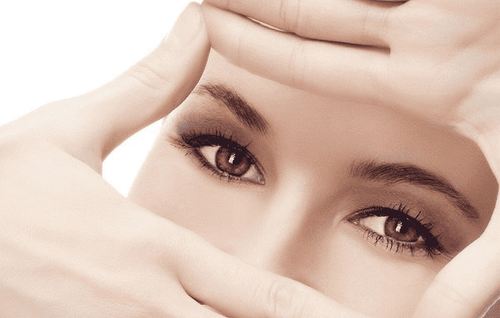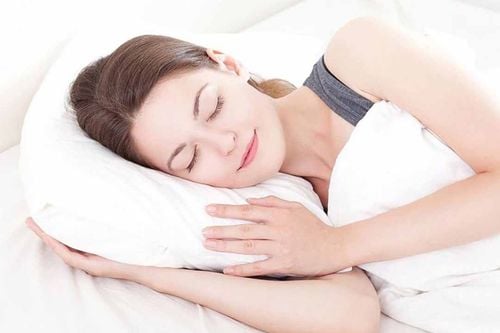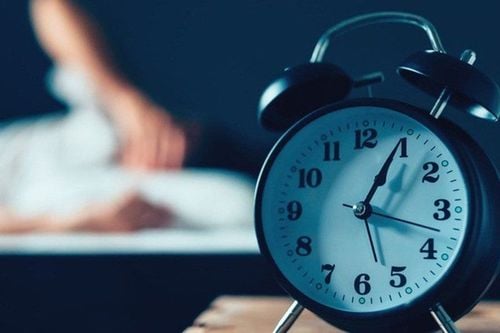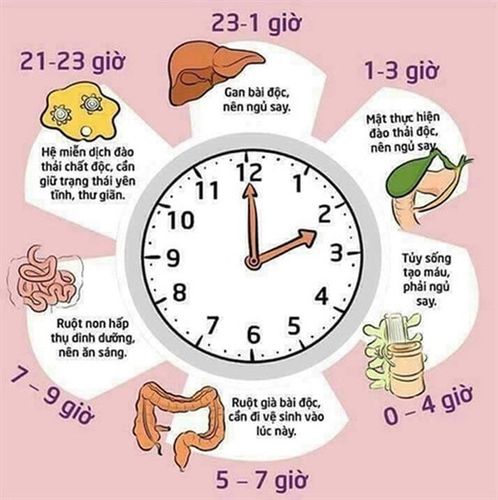This is an automatically translated article.
Your sleep when you are young and in middle age has quite a big difference. Nearly half of men and women over the age of 65 say they have at least one sleep problem. However, in general, the sleep of the elderly is more often disrupted than that of young people.
1. Reasons why aging affects sleep
Aging is associated with many health concerns, including difficulty sleeping. Poor sleep can cause many problems related to reduced quality of life in people over 65 years of age. To better understand sleep and health, especially the sleep of the elderly, it is more important than ever to understand the impact of aging on health. Since nearly one-third of our lives are spent sleeping, revisiting the relationship between old age and adequate sleep is a fundamental part of overall health in the elderly.
Older adults often experience changes in sleep quality and duration. These changes occur due to a change in the body's internal clock. The main clock in a part of the brain called the hypothalamus consists of about 20,000 cells that make up the viral nucleus (SCN). The SCN viral nucleus controls a 24-hour daily cycle, called the circadian rhythm. This circadian rhythm affects daily activity cycles, such as when people are hungry, the body releases certain hormones or when feeling sleepy or awake.
As we age, sleep changes due to the effects of the aging SCN virus nucleus. The decline in function of the SCN viral nucleus can disrupt circadian rhythms, directly affecting when people feel tired and alert.
The SCN nucleus receives information from the eye and light is one of the most powerful signals for maintaining circadian rhythms. Studies show that many older adults are not exposed to enough daylight which can affect the functioning of circadian rhythms, especially for those living in nursing homes as well as having Alzheimer's disease.
Changes in the body's production of hormones, such as melatonin and cortisol, may also play a role in disrupting sleep in older adults. As we age, the body produces less melatonin, which is normally produced in response to darkness, which promotes sleep by regulating circadian rhythms.
2. Health status and sleep
Mental and physical health conditions can also be a cause of sleep disruption. Conditions that are more likely to affect sleep in older adults include depression, anxiety, heart disease, diabetes, and uncomfortable and painful conditions like arthritis.
The relationship between physical health and sleep is complicated by the fact that many older adults are diagnosed with more than one health condition. One study looked at common health conditions and found that 24% of 65-84 year olds reported being diagnosed with four or more health conditions. People with multiple health conditions sleep less than 6 hours, have poor sleep quality, and experience symptoms of a sleep disorder.
Sleep problems may also be related to medication side effects. Nearly 40% of adults over the age of 65 take 5 or more medications. Many over-the-counter and prescription medications can contribute to sleep problems. For example, antihistamines and opiates can cause daytime sleepiness, while medications such as antidepressants and corticosteroids can keep the elderly awake, contributing to symptoms of insomnia. The interaction of many drugs when used together can cause unintended effects on sleep.

Giấc ngủ khoa học giúp ích cho sức khỏe người cao tuổi
3. Lifestyle and sleep
Poor sleep quality in the elderly may be related to lifestyle changes and accompanies the aging process of the body. For example, when a person retires, going out to work will be more limited and can take more naps, a less structured sleep schedule. Other significant changes in an individual's life, such as loss of independence or social isolation, can increase stress and anxiety, contributing to problems affecting sleep.
4. How does aging affect sleep?
Each individual goes through the aging process differently. While some older adults may not complain of significant sleep disruption, others complain of less sleep and poor sleep quality. Sleep disturbances in the elderly can be caused by a number of reasons:
Change in sleep schedule: As people age, the body's circadian rhythm actually changes over time. This shift is called a pre-phase. Waking up at night: Research has also shown that as people age, they often experience changes in their sleep patterns. Older adults spend more time in the early stages of sleep and less time in the later stages. Changes in sleep patterns can cause older adults to wake up more often at night and have more fragmented, less restful sleep. Nap during the day: Research estimates that around 25% of older adults nap compared to about 8% in younger adults. While some experts suggest that a nap during the day can be beneficial, many agree that prolonged naps and naps later in the day can make it harder to fall asleep at bedtime and cause disruption. sleep at night. Changes in the way the body processes circadian rhythms make it harder for older people to adjust to sudden changes in sleep schedules, such as during daylight saving time or when it's late. planes.
5. Sleep problems are common in the elderly
Researchers estimate that between 40 and 70 percent of older adults have chronic sleep problems and up to half of cases may go undiagnosed. Chronic sleep problems can significantly interfere with older adults' daily activities and reduce quality of life. Specifically:
Discomfort and pain can lead to affecting the quality of rest of the body. Pain and insomnia can become a vicious cycle with less sleep causing more pain and more pain causing difficulty sleeping; Nocturia: Nocturia increases with age due to physical changes in the urinary system along with other factors. This problem can affect up to 80% of older adults contributing to increased sleep disruption. Insomnia: Persistent difficulty falling or staying asleep is one of the most common sleep problems in older adults. Insomnia can be caused by many overlapping factors, but it can be relieved with treatment. Daytime Drowsiness: Many people believe that feeling tired during the day is a normal part of getting older, but it's not. About 20% of seniors experience excessive daytime sleepiness, which can be a sign of an underlying health condition rather than simply old age. Sleep Apnea: Obstructive sleep apnea can cause sleep apnea. These pauses are associated with repeated collapse (apnea) or partial collapse of the upper airway. Sleep apnea disrupts sleep and can affect the amount of oxygen in the body, leading to headaches, daytime sleepiness, and difficulty thinking clearly.

Những người lớn tuổi thường xuyên tập thể dục sẽ đi vào giấc ngủ nhanh, lâu và tốt hơn
6. Tips on getting enough sleep for the elderly
Research has shown that older people can take steps to improve their sleep. These activities often involve focusing on improving sleep quality and developing healthy habits that encourage quality sleep.
Exercise : Older people who regularly exercise will fall asleep faster, longer and better. Exercise is considered as one of the best activities that elderly people can do for their health. Reduce distractions in the bedroom: TVs, cell phones, and bright lights can make it harder to fall asleep. Keep the TV in the living room and try not to fall asleep when the TV is on. Move electronic devices out of the bedroom to avoid affecting sleep. Avoid stimulants that affect sleep: Substances like alcohol, tobacco, caffeine, and even large meals late in the day can make it harder to fall asleep. Trying to give up smoking, reduce caffeine intake, and eat dinner earlier (at least 4 hours before bedtime) will help you get a good night's sleep. Stick to a regular sleep schedule: Aging makes it harder to recover from lost sleep, so abrupt changes to your sleep schedule should be avoided. You should go to bed and wake up at the same time every day. Build a bedtime routine: Find activities that help you relax before bed. Many older people like to take a bath, read a book or find some quiet time before going to bed. Overall, aging is associated with many health concerns, including difficulty sleeping. Poor sleep can cause many problems related to reduced quality of life in people over 65 years of age. To better understand sleep and health, especially the sleep of the elderly, it is more important than ever to understand the impact of aging on health.
Please dial HOTLINE for more information or register for an appointment HERE. Download MyVinmec app to make appointments faster and to manage your bookings easily.
References: health.harvard.edu, webmd.com, ncbi.nlm.nih.gov, sleepfoundation.org













